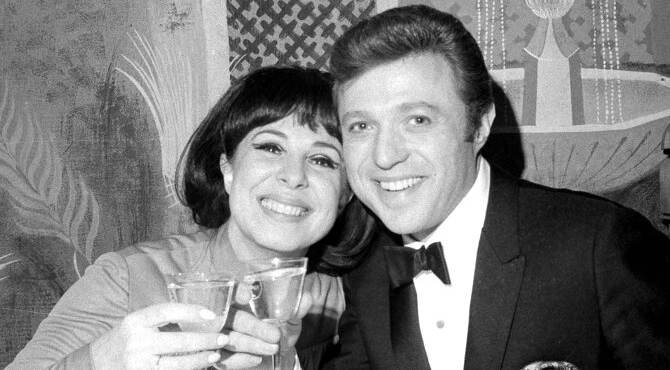Steve Lawrence, a king among easy-listening crooners who rocketed to fame in the ’50s and ’60s as half of the duo Steve and Eydie, died Thursday at age 88. Lawrence died at home in Los Angeles, and the cause of death was complications from Alzheimer’s disease, according to a spokesperson for the family, Susan DuBow.

Lawrence’s Alzheimer’s diagnosis had finally put an end to his touring career in 2019, after a run in the public eye that spanned six and a half decades.
Lawrence was preceded in death in 2013 by his wife, Eydie Gormé, with whom he enjoyed nearly unparalleled success as a performing couple during their heyday as touring artists and TV stars in the ’50s, ’60s and ’70s. The couple had continued to tour together through 2009.
“My Dad was an inspiration to so many people,” his son, David Lawrence, said in a statement. “But, to me, he was just this charming, handsome, hysterically funny guy who sang a lot. Sometimes alone and sometimes with his insanely talented wife. I am so lucky to have had him as a father and so proud to be his son. My hope is that his contributions to the entertainment industry will be remembered for many years to come.”
Appreciations of Lawrence from friends and contemporaries began to roll in Thursday. “Another longtime friend has made his transition,” said Dionne Warwick. “Steve now has joined his true love, his wife Eydie, and is resting with comfort in the arms of the Heavenly Father. My heartfelt condolences go out to both of his sons and host of friends.”

With or without Gormé, Lawrence was a Grammy winner, an Emmy winner and a Tony nominee, the later nod coming for his portrayal of Sammy Glick in a Broadway production of “What Makes Sammy Run” in 1964. He picked up a New York Drama Critics’ Circle Award for that same role, which extended across 504 performances of the show.
One of Lawrence’s signature songs as a TV and Las Vegas nightclub performer was “I’ve Gotta Be Me.” The song had its origins in a Broadway musical that he and Gormé starred in together, “Golden Rainbow,” in 1968
As a solo artist, Lawrence had one song reach the top of the Billboard Hot 100 in 1962, the Goffin-King composition “Go Away Little Girl” (later re-popularized in the ’70s by Donny Osmond). Altogether he had 33 songs chart between 1952-1966, five of which made Billboard’s top 10.
In an interview, Lawrence explained why he never gravitated toward rock ‘n’ roll, despite coming of age as a recording artist in the early part of the rock era. “It didn’t attract me as much,” he told the website Classicbands.com. “I grew up in a time period when music was written by Irving Berlin and Cole Porter and George and Ira Gershwin and Jerome Kern and Oscar Hammerstein and Richard Rodgers and Lorenzt Hart and Sammy Cahn and Julie Stein. Those people, I related to what they were writing because it was much more melodic. It as an intelligent lyric that was written. By and large these people were bright, educated or extremely gifted.”
As a couple, Steve and Eydie had fewer chart successes, landing only four charting songs, none of them major hits — yet their chart stats give little indication of just how ubiquitous the pair became as television personalities.

The duo’s joint success began with their first appearances on “The Tonight Show” when it was fronted by Steve Allen in 1954. The pair also had their own summer replacement series, “The Steve Lawrence and Eydie Gormé Show,” on NBC in 1958.
The solidity of their professional and personal lives notwithstanding, Lawrence regularly worked without Gormé, as an actor as well as a singer. His film roles included parts in “The Blues Brothers,” its sequel “Blues Brothers 2000,” and “Stand Up and Be Counted.” On TV in his later decades, he appeared as the father of Fran Drescher in the final season of “The Nanny,” as well as making guest appearances on “Two and a Half Men” and “Hardcastle and McCormick.” Other, earlier roles included parts on “Police Story,” “Murder, She Wrote” and “Night Gallery
Lawrence enjoyed the irony of sometimes earning greater fame among certain demographics for his bit parts than his singing. “Eydie and I were booked, doing some concerts in Japan — they didn’t know us by face. They go, ‘Oh, “Blues Brothers”!… Maury Sline. That was my name.”
But at least among older generations in the U.S., Lawrence and Gormé were best known for their appearances — apart or together — as themselves, from the variety series hosted by Carol Burnett, Ed Sullivan, Judy Garland and Flip Wilson to prime-time game shows like “What’s My Line?”
Of his many appearances with Burnett, Lawrence told Larry King he was “an irregular regular. I probably did more guest shots on that show than anybody… I knew Carol. We were friends in New York. And we always had a very good working relationship, a good personal relationship. And we had a great comic relationship. Carol and I did a take-off of just about every film that was in the ’30s, the ’40s and the ’50s. … A lot young people that come to our shows, some of them are shocked to learn that I sing. I mean, they know me from the Carol Burnett syndicated comedy shows.”
In 1984, Lawrence took on a TV hosting role for the first time since his black-and-white days, alongside Don Rickles on “Foul-Ups, Bleeps and Blunders,” which ran for two seasons on ABC.
Lawrence, the son of a cantor, was born Sidney Liebowitz in Brooklyn on July 8, 1935. His association with Steve Allen actually pre-dated that personality taking over “The Tonight Show,” as he and Gormé initially hooked up with the host when he was presiding over a local late-night show in New York City in 1953, a year before the bump up to a national platform.
The couple married in Las Vegas in 1957, and remained wed until her death 56 years later. In an appearance on the Larry King show in 2003, the two singers remembered seeing each other perform at the El Rancho Hotel in Vegas, and, according to Lawrence, “She said, ‘If you don’t marry me now, it’s over. You got two days.’ … She put it to me, you know. So finally, I said, OK, and I went down and got the blood test. We got married, and after two days, I went on my honeymoon with Steve Allen to Cuba.”
Lawrence insisted that his wife was the better singer of the two: “The burden was really on Eydie. She has the most extraordinary range. I mean, this woman is like the Yma Sumac of the Bronx…. She has three octaves. I mean, she could sing with me, with Andy Williams, Placido Domingo. She could sing with just about anybody.” But, protested Gorme, “I really, truly always thought it was the other way around. I swear to God.”
Lawrence allowed that he had some pipes, himself. “I have a bigger than normal range because I started as a choirboy,” he explained. “My dad was a cantor. And when you sing religious music… in pop music, it’s usually written in an octave and a third or an octave and a fifth. And religious music is written — you’re all over the place, so the intonation is different.”

Of his range, Lawrence additionally said, “Tony Bennett said to me, ‘I’ll give you $100 for your low notes.’ I said, ‘I’ll give it to you back for your high notes.’”
Although the couple resisted rock ‘n’ roll, they did do a campy rendition of a grunge classic. “Disney came to us,” Lawrence said, “doing a ‘Loungapalooza’ type of album, and they asked us to do a song that was made popular by Soundgarden, which is a heavy metal rock group. And they sent the CD and said… ‘We want you to do it in your own way.’ We did it — ‘Black Hole Sun.’”
Of their relationship, Lawrence said, “I’m very thankful that Eydie and I, not only do we have a great love, (but) a great friendship. I think a relationship either works or doesn’t… I think, also, you have to work at it, if you both feel that there’s something of value there… We’re married people, you know? We fight, and one of the best shows we ever had was on the heels of an argument in the dressing room.”
Their son, David, an Emmy-nominated composer in his own right, had recently produced a documentary about his parents, “Steve Lawrence & Eydie Gorme: Memories of My Mom & Dad,” which premiered in December on PBS.
Besides David, Lawrence is survived by his daughter-in-law Faye, granddaughter Mabel, and brother Bernie. Another son, Michael, died at age 23 in 1986.
The funeral will be private. In lieu of flowers, the family has requested that donations be made to an Alzheimer’s organization here.










